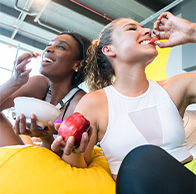The physical practice of yoga does a body good at any age, and with the use of props such as blankets, blocks and chairs, individuals of all ability levels can experience the many physiological and psychological benefits that yoga provides. When combined, these six accessible poses can enhance overall function and well-being, with a focus on improving balance, increasing flexibility, building strength and promoting relaxation.
Standing Crescent Moon Pose
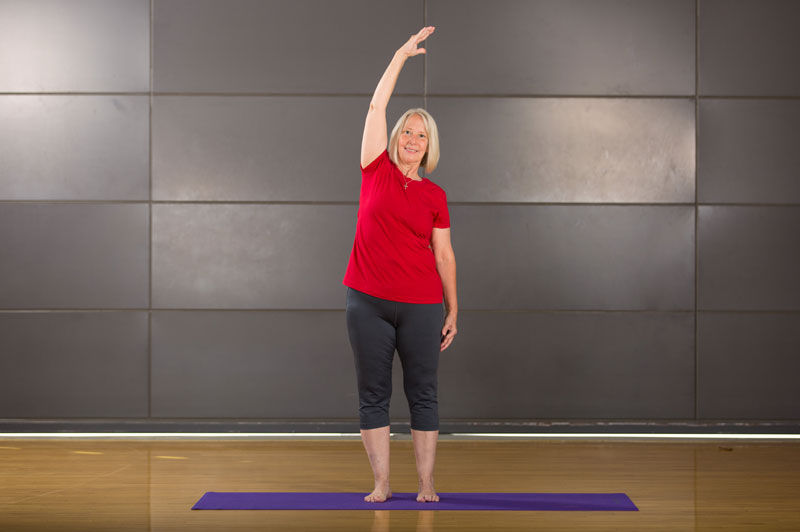
Stand with arms at your sides and feet hip-width distance apart, establishing a firm base of support. Inhale to sweep the left arm up toward the ceiling, with the palm facing the right side of the room. As you exhale, reach the left fingertips up and then over toward the right, stretching the left side of the body. Continue to relax the right arm down at side while pressing firmly and equally through both feet. Maintain this position, breathing comfortably for three to five complete cycles of breath. Return to the starting position and repeat on the other side.
Chair Option
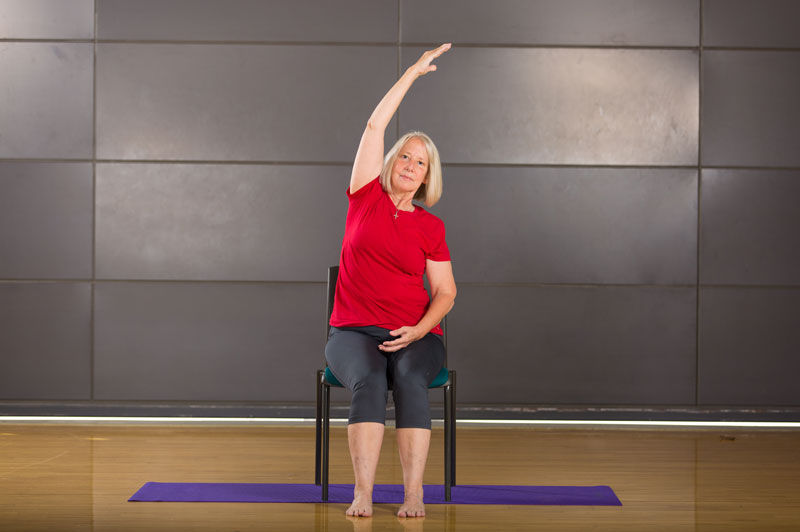
For more support, perform this pose while sitting toward the edge of a chair with feet flat on the floor and the right arm relaxed at the side or, if using a chair with arms, resting on the right thigh.
Warrior II
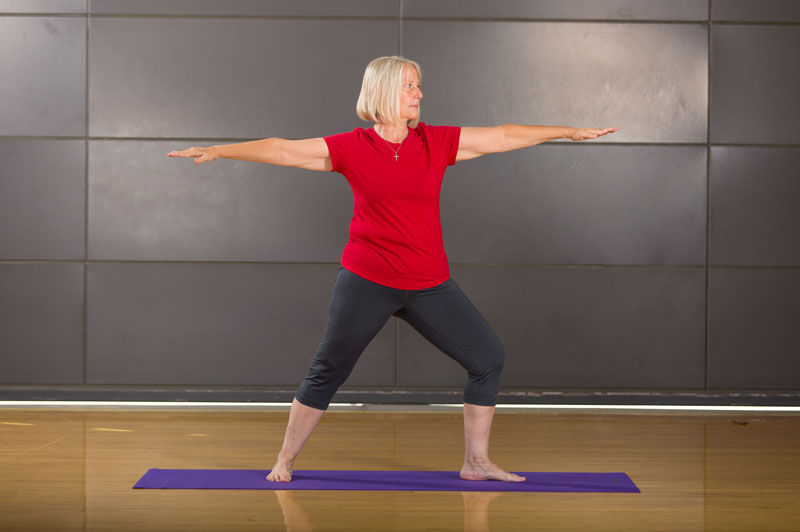
Begin standing with feet together near the front edge of a mat. As you exhale, step the left foot back approximately 3 to 4 feet, turning the left foot out at slightly less than 90 degrees so that the left toes and torso face the left edge of the mat; point the right toes forward to the front edge of the mat. The heel of the right foot should now align closely with the arch of the left foot. Slowly begin to bend the right knee to your comfort level, aligning the right knee with the second toe of the right foot. Continuing to root firmly into the mat with both feet, reach the arms in opposition toward the front and back edges of the mat with palms facing floor. Keep the shoulders stacked over the hips as you gently turn your head toward the front edge of the mat, gazing softly over the right fingertips. Maintain this position, breathing comfortably for three to five complete breath cycles. Return to the starting position near the top of the mat, and repeat on the opposite side.
Chair Option
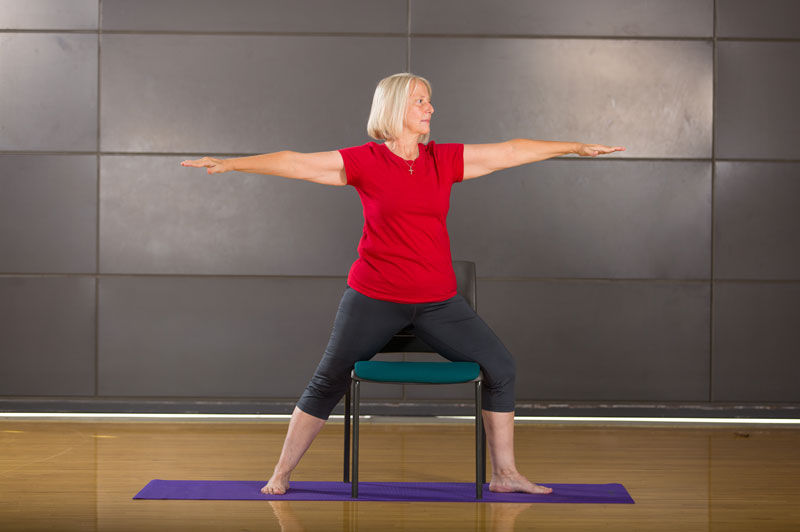
For more support in this pose, straddle a chair with the right thigh and the glutes resting atop the chair. For even greater accessibility, face and hold the back of the chair to assist with balance.
Tree Pose
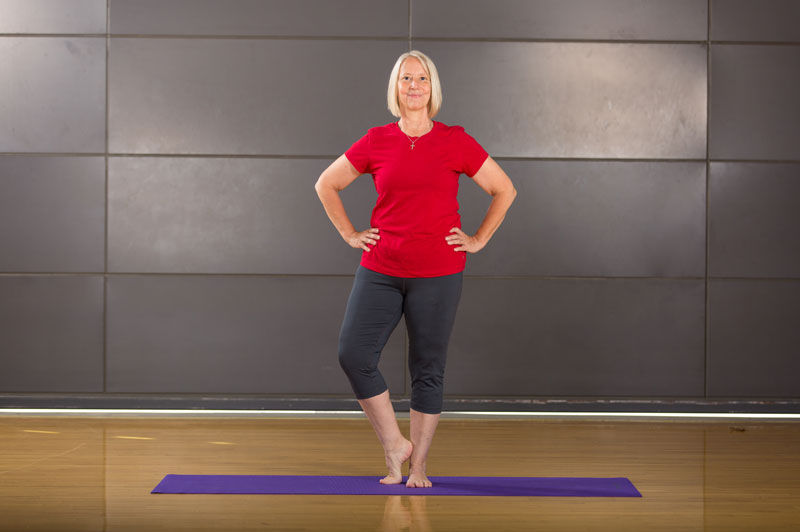
Stand with feet together near the center of a mat, with the hands lightly resting on the hips. Slowly shift your weight into the right foot, rooting down firmly as you peel the left heel off the mat, opening the left knee out while keeping the left toes on the floor. With control, draw either the heel of the left foot to touch just above the right ankle while keeping the toes in contact with mat, or draw the sole of the left foot to gently rest against the inside portion of the right lower leg below the knee. Avoid pushing the right hip out to the right; instead, keep the center of the pelvis directly over the right foot. As an option, join the palms together in front of your chest. Maintain this position, softly gazing at a fixed point in the room as you breathe comfortably for three to five complete breath cycles. Release the left foot to your mat, briefly returning to the starting position before repeating on the opposite side.
Chair Option
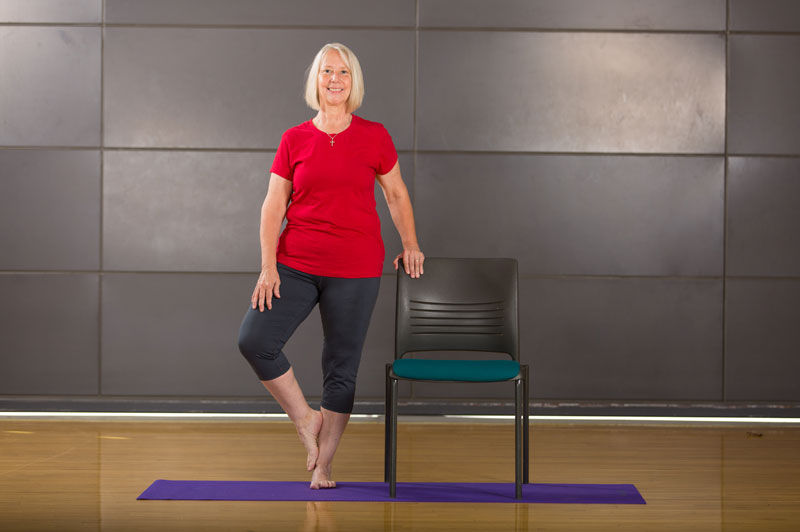
For a more supportive option, utilize a chair to assist with balance. Stand to one side of the chair while resting one hand lightly on the back of the chair for support, or, for an even more accessible option, stand behind the chair and place both hands on the back of the chair directly in front of you.
Half Lord of the Fishes Variation
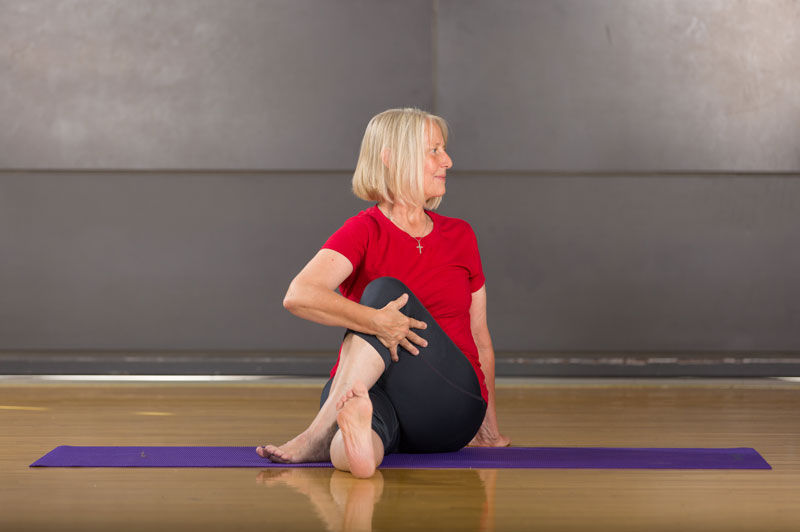
Begin in a seated position on floor with the legs outstretched in front of the body. For additional comfort and support, sit atop a folded towel, blanket or yoga block. Keeping the left leg extended, step the right foot over the left thigh, planting the right foot on the mat with the knee bent. Gently place the right hand behind the right hip with the fingers pointed away from the body. Inhale and extend the left arm toward the ceiling while lengthening the spine. Exhale and gently rotate the torso to the right, hugging the right knee with the left arm or hooking the left elbow outside of the right knee. With each inhalation, continue to explore the length in the spine, while subtly deepening the rotation in the upper back with each exhalation. Maintain this position for three to five complete cycles of breath before switching sides and repeating.
Chair Option
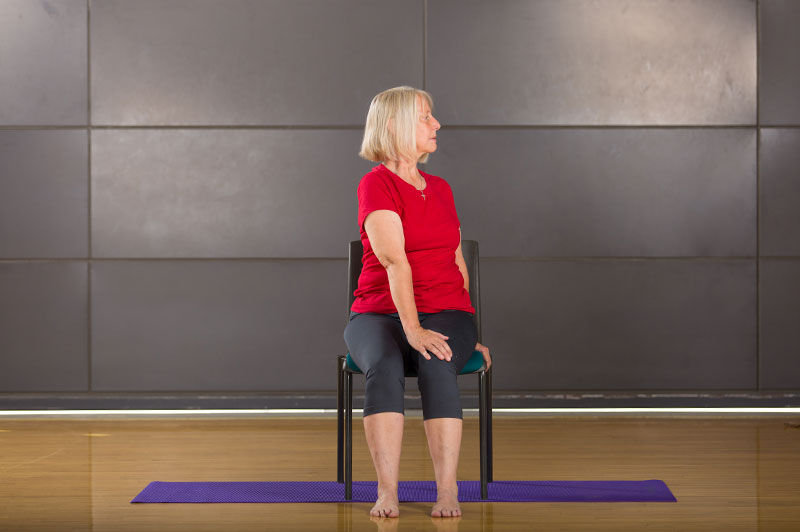
For a more accessible option, perform this pose while seated in a chair. Sit tall with the feet flat on the floor, drawing the right hand to rest toward the back edge of the seat and placing the left hand atop the right thigh.
Extended Puppy Pose
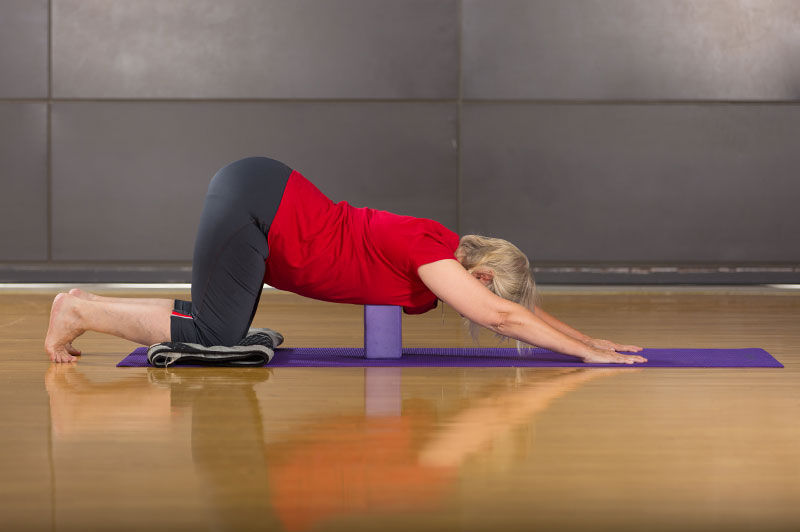
Assume a hands-and-knees position at the center of a mat, with the wrists aligned below the shoulders and the knees aligned below the hips. Rest the knees atop a folded towel or blanket for additional comfort. With the spine extended, walk the hands forward toward the front edge of the mat, allowing the chest to rest on a block for support and the palms to connect to the floor. Continue to keep the hips stacked over the knees, while actively reaching forward with the fingertips. For additional stability, tuck the toes under as opposed to resting the tops of the feet on floor. Maintain this position, breathing deeply for three to five complete cycles of breath.
Chair Option
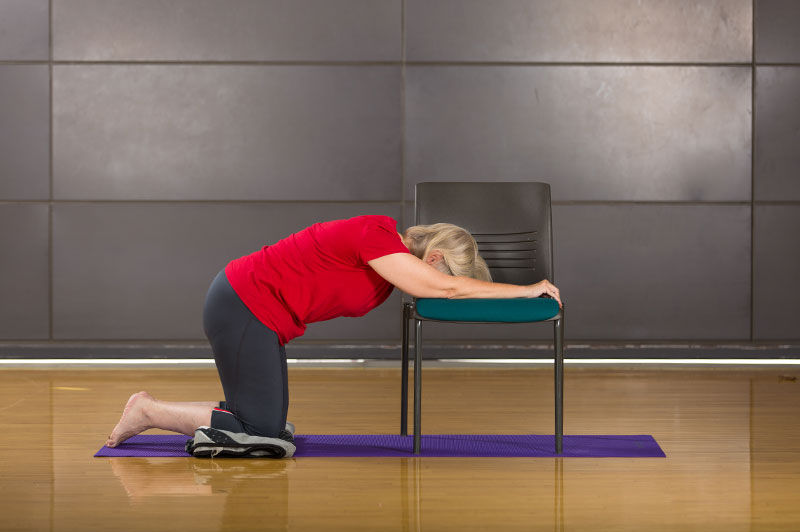
For a more supportive, less-intense stretch, place the hands atop a chair or couch, with either the palms down or the palms facing one another.
Legs-up-the-wall
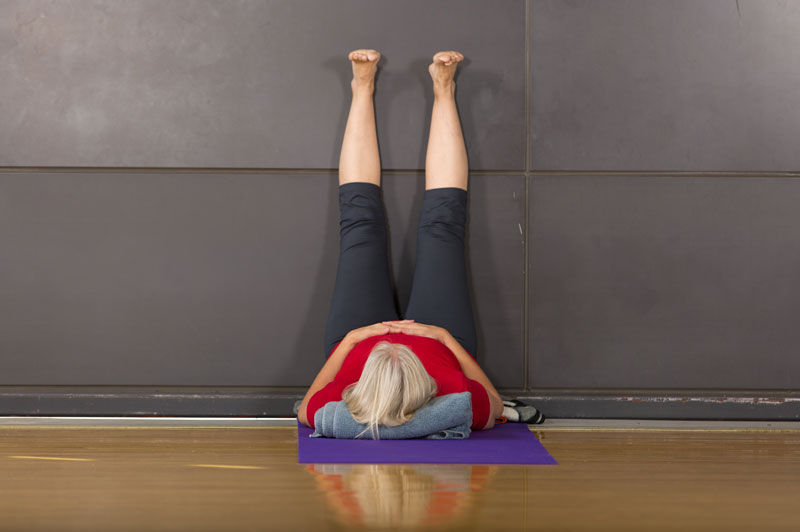
Place a mat perpendicular to a wall. Sit atop a folded blanket or towel positioned at the end of the mat, with the knees bent and the feet flat on the floor, and the right hip resting against a wall. Slowly lower down onto your mat in a supine position perpendicular to the wall, swinging the legs up to rest against the wall while allowing the shoulders and head to rest on the mat. For additional support and comfort, position another folded towel or blanket slightly up the mat upon which to rest the head and neck. Your glutes do not need to be completely against the wall, but should be as close as accessible. Maintain this position with the legs vertically up the wall, while breathing deeply for one full minute.
Chair Option
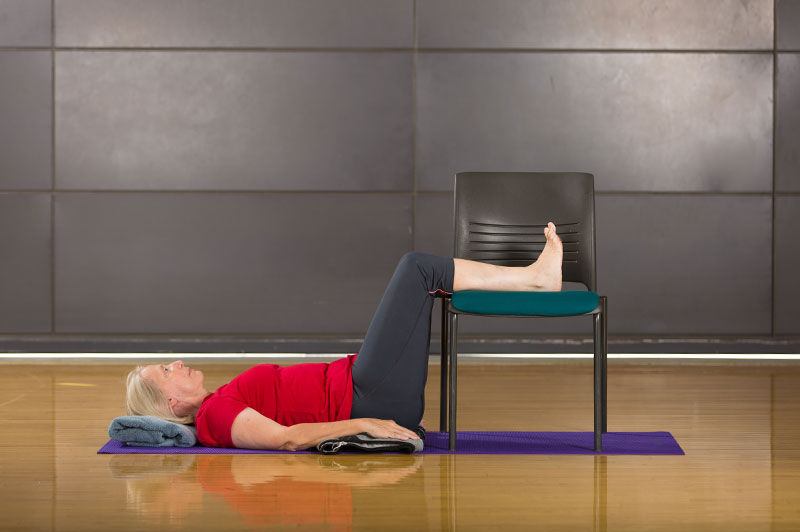
To make this restorative pose even more accessible, rest the lower legs atop a chair or couch, with the knees bent and resting along edge of seat. You may still use a folded towel or blanket beneath the hips and head and neck for added comfort and support.




 by
by 

